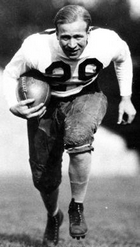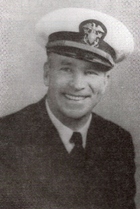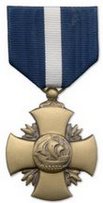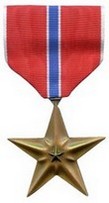Archie Buckley
| Date and Place of Birth: | July 16, 1906 in Colville, WA |
| Date and Place of Death: | February 21, 1945 near Iwo Jima, Volcano Islands |
| Baseball Experience: | College |
| Position: | Third Base |
| Rank: | Lieutenant |
| Military Unit: | US Navy |
| Area Served: | Pacific Theater of Operations |
If ever a coach lived who felt the pain and delight of his
charges, who scaled the heights with them and descended with them to the
depths, it was the fiery mentor from North Central High School.
Spokane Daily Chronicle, March 31, 1945
Archie M. Buckley, the son of Mr. and Mrs. W.L. Buckley, was born on July 16, 1906 in Colville, Washington.
His parents, William and Sara, had moved from Nebraska to Colville the
year before. By 1920 they had moved to Long Beach, California, but then
returned to the Colville area in the mid-1920s.
Buckley graduated from Colville High School in 1926 where he was an
all-around athlete, winning letters in baseball, football and
basketball, also playing for the Colville town baseball team. He entered
Washington State College (now University) in 1926 and continued as a
three-sport star, playing third base for the baseball team, starring as
a forward in basketball and quarterbacking the football team. It was in
football that he became a school sensation in 1929. On October 19,
before 15,000 at WSC's Rogers Field, the University of Washington took
an early 13-0 lead in the game. At that point a quarterback change was
made and Buckley entered the game. According to the Spokesman-Review
account, when Buckley came into the game, WSC showed new life "almost
instantaneously." Before the half, Buckley led the Cougars to a
touchdown that cut the deficit to 13-7 at the break. Buckley drove his
team to the tying score, and then kicked the extra point after the
second touchdown to put WSC ahead 14-13. The Cougars added one more
score and secured their first victory over Washington in three years
with a 20-13 win. At the end of the 1929 season, Buckley was awarded the
J. Fred Bohler award, for being the greatest inspiration on the team.
After graduating in 1930, Buckley took a position as a football coach at
Chehalis High School. In 1931 he moved to North Central High in Spokane
where he coached baseball, basketball and football. He was also a
Pacific Coast conference football and basketball official.
Buckley remained at North Central until taking a leave of absence and enlisting in the Navy in March
1943. He was assigned to the St. Mary's Pre-flight School in California,
where he was in charge of the physical conditioning of the Navy's future
pilots. He was later assigned to duty in the Pacific aboard the USS
Saratoga (CV-3) aircraft carrier.
On 21 February, 1945 the Saratoga was detached with an escort of three
destroyers to join the amphibious forces and carry out night patrols
over Iwo Jima. As she approached her operating area an air attack
developed. Taking advantage of low cloud cover and Saratoga's
insufficient escort, six Japanese planes scored five bomb hits on the
carrier and 123 of her crew were dead or missing.
Lt. Buckley died saving shipmates during that attack. He was
posthumously awarded the Bronze Star and the citation explains his
heroics that day:
"For heroic achievement as Catapult Officer on board the U.S.S.
Saratoga in action against enemy Japanese forces near Iwo Jima, Volcano
Islands, on February 21, 1945. First to observe the Japanese plane
headed in on a lightning course for his carrier, Lieutenant Buckley
remained in the line of enemy strafing, desperatley striving to attract
the attention of his crews and the pilots of two aircraft secured to the
catapults. Refusing to seek cover for himself, he directed all his men
to positions of comparative safety, and was still at his post when the
attacker crashed into the forward end of the flight deck on the
starboard side. Through his alert warning and gallant consideration of
others in the face of imminent peril to himself, the lives of several
men were saved. His courageous conduct was in keeping with the highest
traditions of the United States Naval Service."
An account from one of the men he saved, Ensign Leo Andrecht, read:
"A plane director had just completed hooking my plane to the
starboard catapult, when I suddenly saw Lieutenant Buckley frantically
waving his arms to attract my attention. Upon getting it, he then
pointed starboard aft. As I turned to look aft, I saw him trying to
attract Ensign Powell's attention on the port catapult. I saw two enemy
planes, one on starboard beam, coming in very fast and strafing with an
obvious intent of flying into the starboard side, the other further aft
of which I soon lost sight of. I unbuckled my shoulder straps and made
the starboard life nets as the first bomb hit the port catapult. I
sincerely believe that Lieutenant Buckley's courage to stay and warn us
of the impending danger, before seeking safety himself, kept me from
possible death or serious burns."
On March 31, 1945, the Spokane Daily Chronicle ran the
following tribute to Buckley:
"A coach isn't just an ordinary fellow. He gets close to the guys
who play under him. They listen to him through the long weeks of
preparation. They learn of him, are inspired by him. They drink in his
words of wisdom and thrive on the little crumbs of praise he lets fall
from his high eminence.
"Their hears bleed when the game goes badly; not for themselves but for
the coach as he paces back and forth clenching his fists. They burn with
determination when he shouts at them between halves and weep in the deep
shadows of defeat; not for themselves but for their idol. In time thet
become a part of him and he of them, in long green memories.
"Archie Buckley was a coach. Scattered throughout the west are lads who
played football and baseball under his dynamic leadership. They will
forget most of the details of the games they played, the scores, the
highlights, the plays - everything but the ecstasy and the heartache.
These they will remember and with them, Archie Buckley. If ever a coach
lived who felt the pain and delight of his charges, who scaled the
heights with them and descended with them to the depths, it was the
fiery mentor from North Central High School."
Archie Buckley's body was never recovered and his name appears on the
Tablets of the Missing at the Honolulu Memorial, Hawaii. There is also a
memorial in Highland Cemetery in Colville. He was survived by his wife,
Mary, and two children - J.W. (Bunky) and Betty Moe - who were living in
Encinitas, California, at the time.
Buckley was inducted in the Washington State University Athletic Hall of
Fame in 1984. At North Central High School an annual award is made to a
football, basketball and baseball player whom their teammates feel
exemplifies the accomplishments of Buckley. A permanent trophy rests in
the high
school display case and the name of each winner is inscribed for each
sport.”
Sources:
Spokane Daily Chronicle, March 11, 1933
Spokane Daily Chronicle, March 30, 1945
Spokane Daily Chronicle, March 31, 1945
Spokane Spokesman-Review, March 31, 1945
www.findagrave.com
www.cougfan.com
www.wsucougars.com
www.newgs.org/upload/files/Lets_Remember_WWII.pdf
Date Added March 4, 2013 Updated June 27, 2014
Can you add more information to this biography and help make it the best online resourse for this player? Contact us by email
Read Baseball's Greatest Sacrifice Through The Years - an online year-by-year account of military related deaths of ballplayers
Baseball's Greatest Sacrifice is associated with Baseball Almanac
Baseball's Greatest Sacrifice is proud to be sponsored by






